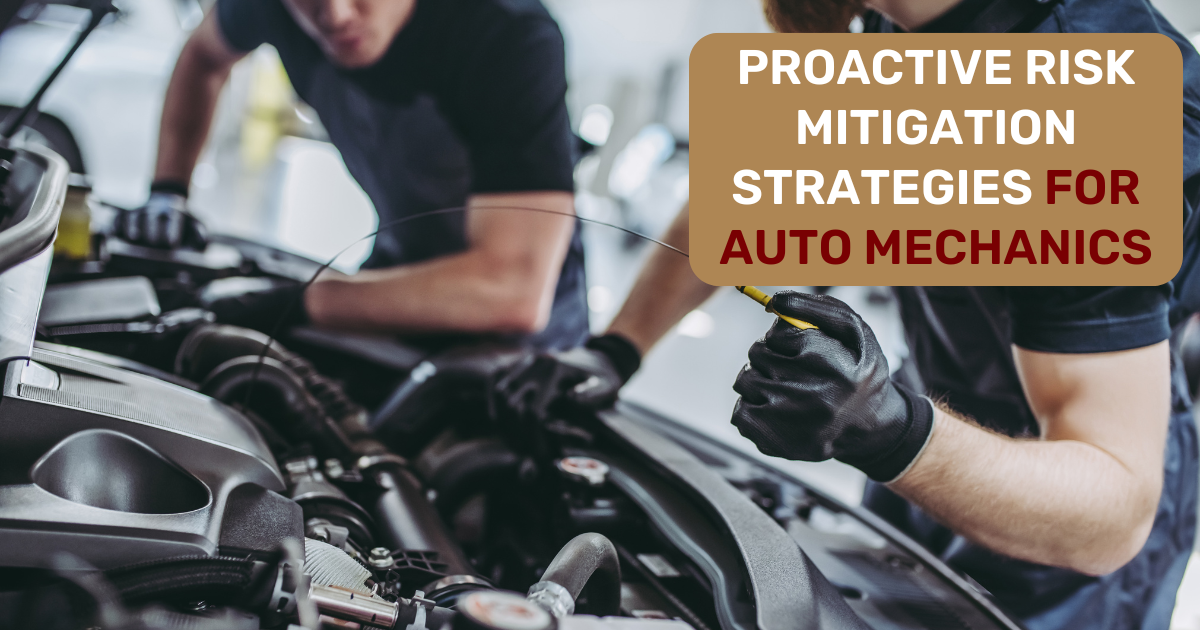
Proactive Risk Mitigation Strategies for Auto Mechanics
Updated: January 9, 2026
Share:
Here are essential risk mitigation strategies every auto mechanic and shop owner should consider:
- Meticulous Documentation and Communication:
- Pre-Service Inspection: Before any work begins, conduct a thorough visual inspection of the customer’s vehicle. Document any pre-existing damage, and take dated photos or videos. This simple step can prevent disputes over damage that was not your fault.
- Detailed Work Orders: Use clear, itemized work orders that list every service to be performed and get the customer’s signature of approval. This manages expectations and provides a clear record of the agreed-upon work.
- Key and Valuables Protocol: Implement a strict process for handling customer keys and personal items left in vehicles. Secure keys in a locked cabinet and instruct employees to never leave keys in an unattended vehicle.
- Maintain a Safe and Organized Environment:
- Cleanliness and Organization: A clean shop is a safe shop. Keep floors free of oil spills, tools, and other debris that could cause slip-and-fall accidents for both employees and customers.
- Clear Signage: Post clear, highly visible signs for “Employees Only” areas, wet floors, and any other potential hazards.
- Proper Storage: Store all flammable materials, chemicals, and hazardous waste in clearly labeled, fire-resistant containers and in designated areas away from heat sources.
- Equipment Maintenance: Regularly inspect and maintain all lifts, jacks, diagnostic equipment, and tools. A sudden equipment failure can not only halt operations but also lead to severe injuries or damage to customer property.
- Invest in Employee Training and Safety:
- Continuous Safety Training: Conduct regular training sessions on workplace safety protocols, proper lifting techniques, and the correct use of personal protective equipment (PPE), such as safety glasses, gloves, and respirators.
- New Technology Training: As modern vehicles become more complex, ensure your mechanics are trained and certified to work on new technology, such as hybrid and electric vehicle systems. This reduces the risk of professional errors and injuries.
- Certification and Expertise: Encourage and support your mechanics in obtaining professional certifications (e.g., ASE certification). This not only improves the quality of your service but also demonstrates a high level of expertise that can be an advantage in a legal dispute.
- Enhance Security Measures:
- On-Site Security: Your lot and garage are filled with valuable assets. Install high-quality security cameras, motion-activated lighting, and a robust alarm system to deter theft and vandalism.
- Secure Parking: If possible, store customer vehicles in a secure, locked garage overnight rather than an open lot.
- Vehicle Tracking: For high-value vehicles in your possession, consider using temporary GPS trackers to aid in recovery in case of theft.
By integrating these proactive strategies into your daily operations, you demonstrate a commitment to safety and professionalism that protects not only your customers’ property but also your business’s reputation and financial stability.

